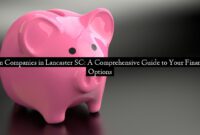Hamoraon.com – Understanding the Benefits of DSCR Loans in Florida Are you a real estate investor looking for financing options in the Sunshine State? If so, you may have come across the term “DSCR loans.” In this comprehensive blog article, we will delve into the details of DSCR loans in Florida, explaining what they are and why they are a popular choice for investors in the state.
So, let’s start with the basics. DSCR stands for Debt Service Coverage Ratio, and it is a crucial metric used by lenders to evaluate the ability of a borrower to cover their debt payments. In simple terms, DSCR loans are specifically designed for investment properties, allowing investors to secure financing based on the income generated by the property, rather than solely relying on personal income or credit history.
How Do DSCR Loans Work?
In order to understand how DSCR loans work, it is important to grasp the concept of Debt Service Coverage Ratio (DSCR). The DSCR is a ratio that compares the property’s net operating income (NOI) to its debt obligations. Lenders use this ratio to assess the property’s ability to generate enough income to cover the mortgage payments.
When applying for a DSCR loan, lenders typically require a minimum DSCR of 1.25, meaning that the property’s net operating income should be 1.25 times greater than the mortgage payment. This ensures that there is a sufficient cushion to cover any unexpected expenses or fluctuations in rental income.
Once the DSCR is calculated, lenders determine the loan amount based on the property’s projected cash flow. Since DSCR loans focus on the property’s income rather than the borrower’s personal finances, investors with lower credit scores or limited income can still qualify for financing, as long as the property’s income is strong.
Calculating the DSCR
The DSCR is calculated by dividing the property’s net operating income by its total debt service. Net operating income is the total income generated by the property, minus operating expenses such as property taxes, insurance, and maintenance costs. Total debt service includes the principal and interest payments on the loan.
For example, if a property has a net operating income of $100,000 and a total debt service of $80,000, the DSCR would be 1.25 ($100,000 / $80,000 = 1.25). This means that the property’s income is 1.25 times greater than its debt obligations, meeting the minimum requirement set by lenders.
Loan Terms and Conditions
DSCR loans typically have longer loan terms compared to traditional mortgages. While traditional mortgages may have terms of 15 or 30 years, DSCR loans often have terms ranging from 5 to 20 years, depending on the lender and the specific property.
Interest rates for DSCR loans may also be slightly higher than traditional mortgages, reflecting the higher risk associated with investment properties. However, the ability to secure financing based on the property’s income can outweigh the slightly higher interest rates, especially for investors who may not qualify for traditional mortgages due to their personal financial situation.
It is important to note that DSCR loans are typically non-recourse loans, meaning that the lender’s recourse is limited to the collateral (the property) and not the borrower’s personal assets. This provides an additional layer of protection for the investor.
Benefits of DSCR Loans for Real Estate Investors
DSCR loans offer a range of benefits that make them an attractive financing option for real estate investors in Florida. Let’s explore some of the key advantages:
Higher Loan Amounts
One of the primary benefits of DSCR loans is the ability to secure higher loan amounts compared to traditional mortgages. Since the loan amount is based on the property’s income, investors can potentially borrow more money, allowing them to finance larger investment properties or acquire multiple properties simultaneously.
This flexibility in loan amounts can be particularly beneficial for investors looking to expand their real estate portfolios and maximize their returns in the Florida market.
Flexible Underwriting Criteria
Unlike traditional mortgages that heavily rely on personal income and credit history, DSCR loans have more flexible underwriting criteria. While the borrower’s creditworthiness is still considered, the primary focus is on the property’s income and its ability to generate sufficient cash flow.
This is especially advantageous for investors who may have lower credit scores or limited personal income, as they can still qualify for financing if the property’s income meets the lender’s requirements.
Additionally, DSCR loans often have more lenient debt-to-income ratio requirements, as the property’s income is the main factor in determining loan eligibility. This can be a significant advantage for investors with multiple properties or higher personal debt.
Improved Cash Flow
One of the main goals for real estate investors is to generate positive cash flow from their properties. DSCR loans can help investors achieve this by basing the loan amount on the property’s income potential.
By securing financing that aligns with the property’s income, investors can ensure that their mortgage payments are covered, leaving room for positive cash flow. This can provide a steady stream of income and contribute to the overall profitability of the investment.
Furthermore, the ability to generate positive cash flow can also help investors build equity in their properties over time, increasing their net worth and creating potential opportunities for future investments or refinancing.
Long-Term Investment Strategy
DSCR loans are particularly well-suited for real estate investors with a long-term investment strategy. Since these loans often have longer terms compared to traditional mortgages, investors can benefit from stability and predictability in their financing.
By securing a DSCR loan with a fixed interest rate for a longer term, investors can have a clear understanding of their monthly mortgage payments over an extended period. This can help them plan and budget effectively, allowing for better financial management and risk mitigation.
Additionally, the longer loan terms provide investors with more time to generate income from their properties and potentially increase the property’s value through appreciation or strategic improvements.
Eligibility Criteria for DSCR Loans in Florida
While DSCR loans provide attractive financing options, they are not available to everyone. Lenders have specific eligibility criteria that borrowers must meet in order to qualify for these loans. Let’s explore some of the key requirements:
Property Type
DSCR loans are primarily designed for investment properties, including residential rental properties, commercial properties, and multifamily properties. The property type plays a crucial role in determining loan eligibility, as lenders assess the income potential and market demand for the specific property.
It is important to note that DSCR loans are typically not available for owner-occupied properties, as the focus is on the property’s income rather than the borrower’s personal financial situation.
Debt Service Coverage Ratio (DSCR)
As mentioned earlier, the DSCR is a key metric used by lenders to evaluate the property’s ability to generate sufficient income to cover the mortgage payments. Lenders typically require a minimum DSCR of 1.25, although some lenders may have slightly different requirements.
It is important for borrowers to calculate the DSCR accurately before applying for a DSCR loan. This can be done by analyzing the property’s net operating income and total debt service. If the calculated DSCR meets the lender’s requirement, the borrower may be eligible for a DSCR loan.
Creditworthiness
While DSCR loans focus primarily on the property’s income, the borrower’s creditworthiness is still considered by lenders. A higher credit score can increase the chances of loan approval and may also result in more favorable loan terms, such as lower interest rates.
However, borrowers with lower credit scores may still qualify for DSCR loans, as the focus is primarily on the property’s income potential. This can be beneficial for investors who have limited credit history or previous financial challenges.
Property Appraisal
Lenders typically require a property appraisal as part of the loan application process. The appraisal helps determine the current market value of the property and assesses its condition and potential for rental income.
The appraisal is an essential step in the loan approval process, as it provides lenders with an accurate assessment of the property’s value and income potential. A favorable appraisal can increase the likelihood of loan approval and potentially result in more favorable loan terms.
Finding Lenders Offering DSCR Loans in Florida
Now that you understand the benefits and eligibility criteria, the next step is to find lenders who specialize in providing DSCR loans in Florida. Here are some strategies to help you locate reputable lenders:
Research Online
The internet is a valuable resource for finding lenders that offer DSCR loans in Florida. Start by conducting a thorough online search and explore websites of banks, credit unions, and other financial institutions that provide real estate financing.
Many lenders will have dedicated sections on their websites that outline the types of loans they offer, including DSCR loans. Take the time to review these sections and gather information about their loan terms, eligibility criteria, and application process.
Seek Recommendations
Networking with other real estate investors can be an effective way to find lenders who offer DSCR loans. Reach out to local real estate investment associations, attend industry conferences, or join online forums and communities wherereal estate investors share their experiences and recommendations. By connecting with experienced investors, you can gain valuable insights into lenders who specialize in DSCR loans in Florida.
Don’t hesitate to reach out to fellow investors and ask for recommendations. They may be able to provide you with the names of lenders they have had positive experiences with, giving you a starting point for your search.
Consult with Real Estate Professionals
Real estate professionals, such as real estate agents, brokers, or property managers, often have knowledge of lenders who offer DSCR loans in the local market. These professionals work closely with investors and have connections within the industry.
Consider reaching out to real estate professionals in your area and inquire about lenders who specialize in DSCR loans. They may be able to provide you with recommendations or refer you to lenders they have worked with in the past.
Attend Real Estate Networking Events
Real estate networking events provide an excellent opportunity to meet lenders and learn more about their financing options. These events often feature guest speakers, panel discussions, and networking sessions where you can connect with industry professionals.
Check for local real estate networking events in your area and make an effort to attend. Engage in conversations with lenders and express your interest in DSCR loans. They may be able to provide you with more information or direct you to the appropriate contact within their organization.
Work with a Mortgage Broker
Consider enlisting the services of a mortgage broker who specializes in real estate investment loans. Mortgage brokers have access to a wide range of lenders and can help match you with the most suitable lender for your specific needs.
Consult with a mortgage broker who has experience with DSCR loans in Florida. They can guide you through the application process, help you gather the necessary documentation, and negotiate on your behalf to secure the best possible loan terms.
Tips for a Successful DSCR Loan Application
Applying for a DSCR loan requires careful preparation and attention to detail. Here are some essential tips and strategies to increase your chances of a successful loan application:
Organize Your Financial Documents
Prior to applying for a DSCR loan, gather all the necessary financial documents to support your application. This may include tax returns, bank statements, rental income statements, and any other relevant financial records.
Organize these documents in a clear and concise manner, ensuring that they are up to date and readily accessible. This will demonstrate your preparedness and professionalism to the lender, increasing your credibility as a borrower.
Showcase Strong Property Income
Since DSCR loans are primarily based on the property’s income, it is crucial to showcase the property’s strong income potential. Provide the lender with detailed rental income statements, occupancy rates, and any other relevant data that highlights the property’s cash flow.
Include information about the rental history, lease agreements, and market research to support your projections of the property’s income. The more evidence you can provide to demonstrate the property’s income-generating capabilities, the stronger your loan application will be.
Highlight Your Real Estate Experience
Emphasize your experience and expertise as a real estate investor when applying for a DSCR loan. Provide a summary of your past successful investments, including their financial performance and any value-added strategies you implemented.
Highlight any relevant certifications or training you have completed in real estate investing. This will demonstrate to the lender that you are knowledgeable about the market and capable of managing investment properties effectively.
Prepare a Solid Business Plan
A well-prepared business plan can significantly enhance your loan application. Outline your investment strategy, including your goals, target market, and plans for property management and maintenance.
Include a detailed financial analysis, outlining your projected income and expenses for the property. This will provide the lender with a comprehensive understanding of your investment objectives and how you plan to achieve them.
Build Relationships with Lenders
Developing relationships with lenders can be advantageous when applying for a DSCR loan. Take the time to connect with lenders, attend industry events, and engage in conversations to build rapport and establish a professional network.
By cultivating relationships with lenders, you may gain insights into their specific requirements and preferences. This knowledge can help you tailor your loan application to meet their expectations, increasing the likelihood of approval.
Case Studies: Real-Life Examples of DSCR Loan Success Stories
Nothing beats learning from real-life experiences. Let’s explore a few case studies that illustrate how investors in Florida have successfully utilized DSCR loans to achieve their financial goals:
Case Study 1: The Multifamily Investor
John, an experienced real estate investor, was looking to expand his portfolio by acquiring a multifamily property in Miami. He identified a promising property that generated significant rental income but required financing beyond what traditional mortgages could offer.
John approached a lender specializing in DSCR loans and provided comprehensive financial documentation, including rental income statements and market research supporting the property’s potential. The lender evaluated the property’s DSCR, which exceeded the minimum requirement, and approved John’s loan application.
Thanks to the DSCR loan, John was able to acquire the multifamily property and increase his rental income significantly. The positive cash flow allowed him to reinvest in further properties, expanding his real estate portfolio in Florida.
Case Study 2: The Commercial Property Investor
Sarah, a seasoned investor focusing on commercial properties, identified a prime location in Orlando for a new office building. She needed substantial financing to cover the costs of construction and to secure long-term tenants.
Sarah approached a lender specializing in commercial DSCR loans and presented a detailed business plan outlining the income potential of the office building. The lender conducted a thorough evaluation of the property’s projected cash flow and approved Sarah’s loan application based on the strong DSCR.
With the DSCR loan, Sarah was able to complete the construction of the office building and secure reputable tenants. The property’s income exceeded expectations, allowing her to repay the loan and generate significant profits from the investment.
Alternatives to DSCR Loans for Real Estate Investors
While DSCR loans offer a host of benefits, they may not be suitable for every investor or every situation. Let’s explore some alternative financing options available to real estate investors in Florida:
Traditional Mortgages
Traditional mortgages, offered by banks and financial institutions, are the most common form of financing for residential properties. These loans typically require a down payment and rely heavily on the borrower’s personal income and credit history.
While traditional mortgages may have stricter qualification criteria, they often offer lower interest rates and longer terms compared to DSCR loans. Investors with strong personal finances and a stable income may find traditional mortgages to be a suitable financing option.
Private Lenders
Private lenders, such as individuals or private investment firms, offer alternative financing options for real estate investors. These lenders often have more flexible underwriting criteria and can provide financing for both residential and commercial properties.
Private lenders may offer shorter loan terms and higher interest rates compared to traditional mortgages or DSCR loans. However, they can be a viable option for investors who may not meet the strict requirements of traditional lenders or who need financing quickly.
Hard Money Loans
Hard money loans are short-term, high-interest loans typically secured by the property itself. These loans are often used for fix-and-flip projects or when investors need quick financing for time-sensitive opportunities.
Hard money lenders focus primarily on the property’s value rather than the borrower’s creditworthiness. While these loans can be more expensive due to higher interest rates and fees, they can provide investors with the necessary capital to complete a project or acquire a property.
Partnerships and Joint Ventures
Another alternative to financing through loans is forming partnerships or joint ventures with other investors. By pooling resources and expertise, investors can collectively finance a property or project.
Partnerships and joint ventures allow investors to leverage each other’s strengths and share the risks and rewards of the investment. This option can be particularly beneficial for investors with limited personal funds or those looking to diversify their investment portfolio.
Risks and Considerations of DSCR Loans
As with any financial decision, it is crucial to understand the potential risks and considerations associated with DSCR loans. Let’s explore some of the key factors to consider:
Market Volatility and Property Performance
The performance of the property and its ability to generate sufficient income can be affected by market volatility. Changes in rental demand, market conditions, or property management issues can impact the property’s cash flow and potentially affect the borrower’s ability to meet the loan obligations.
It is important for investors to conduct thorough market research and consider potential risks before applying for a DSCR loan. Having contingency plans for various scenarios can help mitigate potential challenges and ensure the property’s income remains stable.
Interest Rates and Loan Terms
DSCR loans often come with higher interest rates compared to traditional mortgages. Investors should carefully consider the impact of these higher rates on the property’s cash flow and overall profitability.
Additionally, the terms of the loan, such as the length of the repayment period, should align with the investor’s long-term investment strategy. It is crucial to assess whether the loan terms are suitable for the property’s projected income and the investor’s financial goals.
Property Valuation and Appraisal
The accuracy of the property’s valuation and appraisal is an important consideration when applying for a DSCR loan. If the property is overvalued or the appraisal does not accurately reflect the rental income potential, it can impact the loan amount and the investor’s ability to secure financing.
Investors should ensure that a reputable appraiser with experience in the local market evaluates the property. Conducting thorough due diligence on the property’s value can help avoid potential issues during the loan application process.
Loan Repayment Obligations
As with any loan, borrowers must carefully consider their ability to meet the loan repayment obligations. While DSCR loans are based on the property’s income, it is crucial to assess the stability and predictability of that income over the long term.
Factors such as tenant turnover, vacancy rates, and potential repairs or maintenance costs should be considered when evaluating the property’s cash flow and the borrower’s ability to make mortgage payments consistently.
Frequently Asked Questions about DSCR Loans in Florida
In this section, we will address common questions and concerns raised by real estate investors regarding DSCR loans in Florida. Let’s explore some of the frequently asked questions:
1. Can I use DSCR loans for residential rental properties in Florida?
Yes, DSCR loans can be used for residential rental properties, as well as commercial and multifamily properties. The primary requirement is that the property generates sufficient income to meet the lender’s DSCR ratio.
2. How do lenders calculate the DSCR?
Lenders calculate the DSCR by dividing the property’s net operating income (NOI) by its total debt service. The NOI is the property’s income after deducting operating expenses, while the total debt service includes the principal and interest payments on the loan.
3. What is the typical minimum DSCR required by lenders?
Most lenders require a minimum DSCR of 1.25 for DSCR loans. However, this requirement may vary slightly depending on the lender and the specific property.
4. Do I need a high credit score to qualify for a DSCR loan?
While creditworthiness is considered by lenders, DSCR loans focus primarily on the property’s income potential. Investors with lower credit scores may still qualify for financing if the property’s income meets the lender’s requirements.
5. Can I use DSCR loans for properties I plan to fix and flip?
DSCR loans are not typically used for fix-and-flip projects, as they are designed for long-term investment properties. For fix-and-flip projects, investors often opt for short-term, high-interest loans known as hard money loans.
6. Can I refinance my existing mortgage with a DSCR loan?
Yes, it is possible to refinance an existing mortgage with a DSCR loan, especially if you want to leverage the property’s income potential for better loan terms or to free up funds for additional investments. Consult with lenders specializing in DSCR loans to explore your options.
The Future of DSCR Loans in Florida
In this final section, let’s discuss the future prospects of DSCR loans in Florida’s real estate market. While we cannot predict the future with certainty, we can examine industry trends and potential regulatory changes to provide insights into what the future holds for this financing option.
Continued Demand for Investment Properties
Florida’s real estate market has shown resilience and continued growth over the years, attracting investors from around the country and the world. As long as there is demand for investment properties in Florida, the need for financing options tailored to these properties, such as DSCR loans, is likely to remain strong.
Shifts in Lending Regulations and Policies
The lending landscape is subject to regulatory changes and evolving policies. It is important for investors to stay informed about any potential shifts in lending regulations that may impact the availability or terms of DSCR loans in Florida.
Changes in interest rates, lending criteria, or government-backed loan programs can influence the attractiveness of DSCR loans compared to other financing options. Monitoring these developments can help investors make informed decisions about their financing strategies.
Advancements in Technology and Underwriting Processes
The real estate industry, like many other sectors, is undergoing a digital transformation. Technological advancements in underwriting processes, data analysis, and loan origination can streamline the DSCR loan application process and make it more efficient for both borrowers and lenders.
Investors can expect to see advancements in online platforms, automated valuation models, and predictive analytics, which can improve the accuracy and speed of loan approvals. These technological developments may further facilitate the accessibility and availability of DSCR loans for real estate investors in Florida.
In conclusion, DSCR loans in Florida offer real estate investors a unique financing option based on the income potential of their investment properties. Understanding how these loans work, their benefits, and the eligibility criteria is crucial for making an informed decision. By considering the tips, case studies, and alternatives discussed in this article, investors can navigate the world of DSCR loans and optimize their real estate investments in the Sunshine State.



